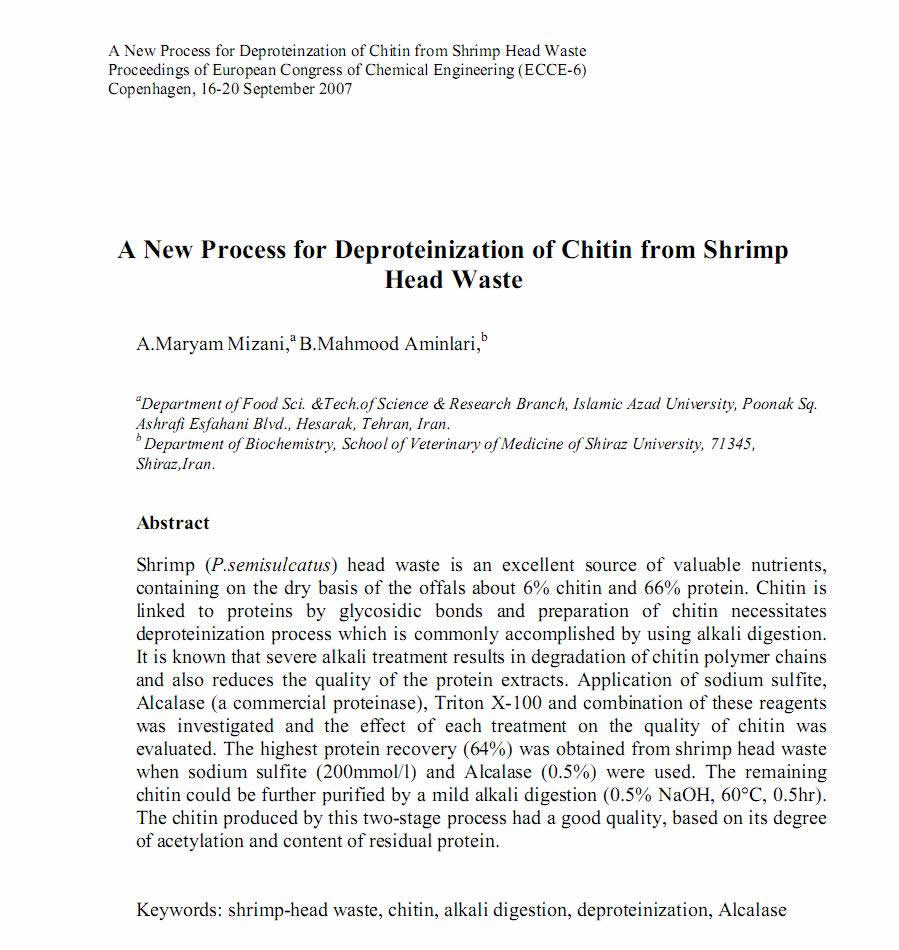 A New Process for Deproteinization of Chitin from Shrimp Head Waste
A New Process for Deproteinization of Chitin from Shrimp Head WasteMizani, M; Aminlari, M; 2007; A New Process for Deproteinization of Chitin from Shrimp Head Waste; European Congress of Chemical Engineering (ECCE-6); 16-20 Sept; Copenhagen, Denmark.
Abstract: Shrimp (P.semisulcatus) head waste is an excellent source of valuable nutrients, containing on the dry basis of the offals about 6% chitin and 66% protein. Chitin is linked to proteins by glycosidic bonds and preparation of chitin necessitates deproteinization process which is commonly accomplished by using alkali digestion. It is known that severe alkali treatment results in degradation of chitin polymer chains and also reduces the quality of the protein extracts. Application of sodium sulfite, Alcalase (a commercial proteinase), Triton X-100 and combination of these reagents was investigated and the effect of each treatment on the quality of chitin was evaluated. The highest protein recovery (64%) was obtained from shrimp head waste when sodium sulfite (200mmol/l) and Alcalase (0.5%) were used. The remaining chitin could be further purified by a mild alkali digestion (0.5% NaOH, 60°C, 0.5hr). The chitin produced by this two-stage process had a good quality, based on its degree of acetylation and content of residual protein.
Keywords: shrimp-head waste, chitin, alkali digestion, deproteinization, Alcalase
Visit: 8854
Abstract: Shrimp (P.semisulcatus) head waste is an excellent source of valuable nutrients, containing on the dry basis of the offals about 6% chitin and 66% protein. Chitin is linked to proteins by glycosidic bonds and preparation of chitin necessitates deproteinization process which is commonly accomplished by using alkali digestion. It is known that severe alkali treatment results in degradation of chitin polymer chains and also reduces the quality of the protein extracts. Application of sodium sulfite, Alcalase (a commercial proteinase), Triton X-100 and combination of these reagents was investigated and the effect of each treatment on the quality of chitin was evaluated. The highest protein recovery (64%) was obtained from shrimp head waste when sodium sulfite (200mmol/l) and Alcalase (0.5%) were used. The remaining chitin could be further purified by a mild alkali digestion (0.5% NaOH, 60°C, 0.5hr). The chitin produced by this two-stage process had a good quality, based on its degree of acetylation and content of residual protein.
Keywords: shrimp-head waste, chitin, alkali digestion, deproteinization, Alcalase
Visit: 8854
design by: webcandy.ir
